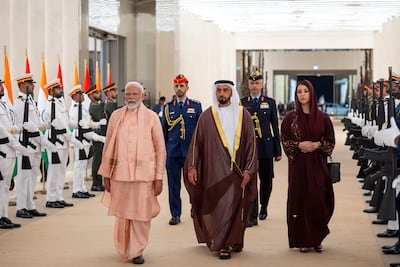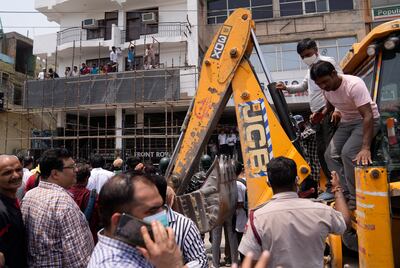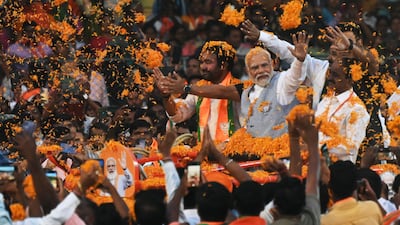As Indian Prime Minister Narendra Modi seeks a third term in the national elections, political analysts predict a victory for his party due to economic progress and popularising Hindu nationalist sentiments.
Both the rising economic growth and right wing surge are hard to deny, explaining the adoration of Mr Modi's supporters and rising anger among his detractors, who say his nationalism could permanently divide India.
The world’s largest democracy of 1.4 billion people goes to polls next month, with a new government in office by June.
Over 970 million people are eligible to vote in the nearly seven-week mammoth exercise.
author specialising in Hindu nationalism
Mr Modi, 73, who first came to power in 2014 and again with a bigger mandate in 2019, has claimed his party will win with a record lead in the poll.
Since his first term in 2014, Mr Modi has focused on building resilient infrastructure to match the needs of a growing population, spending billions of dollars in upgrading highways, waterways and airports and revamping British-era railways.
He started the ambitious project of eradicating the practice of open defecation and his government has built 120 million toilets in rural areas.
His government claims to have built over 55,000km of highways in the last decade and laid 25,000km of railway tracks.
The right-wing government has opened freight corridors and indigenous semi-high-speed trains like Vande Bharat Express, 10 of which he flagged off in just one day earlier this month.
He has also launched seven airports, laid the foundation for 15 new airport terminals and over 35 million houses for the poor in the last four years.
He has also given a push to India's digital economy.
“There has been quite a radical transformation of the face of India just in terms of moving towards more modern living amenities whether it is communication, digitisation or roofs over their heads,” Arati Jerath, Delhi-based Political Analyst, told The National.
“The process had already started but under him, it has accelerated. There has been a huge spurt in building roads in rural India, pucca housing for the poor and building toilets in rural India, virtual payments … these are things which have been a huge boon for people.”
Muscular diplomacy and investment
Many experts believe India’s foreign policy has become more muscular under Mr Modi as it aims to increase manufacturing at home and attract investment.
India has always aimed at maintaining strategic and military ties with most of the world’s powers, and alliances have been further cemented in Mr Modi’s era, including with the US and Russia.
He has made 74 foreign trips – about half of them in the first five years – more than double the previous Prime Minister Manmohan Singh’s two terms.
He has also attended high-profile summits across the world and has invited presidents and heads of state such as US Presidents Barack Obama, Donald Trump and Joe Biden, and UAE President Sheikh Mohamed.
In particular, he's made outreach to West Asian countries like Saudi Arabia and the UAE with which India has signed a pact to achieve its $100 billion trade goal in the next five years.
India is aiming for $100 billion in annual foreign direct investment "in the next few years", Information Technology Minister Ashwini Vaishnaw said in January. The country attracted FDI inflows of $33 billion in the first six months of the current financial year that started in April 2023. It recorded FDI of $71 billion in the 2022-23 financial year, Reuters reported.

Meanwhile, historic rivalries have remained. It has launched punitive attacks on arch-rival Pakistan following militant attacks by groups India claims are backed by Islamabad.
“One of the major changes in the past ten years is the recalibration of foreign policy towards promoting trade, attracting FDI and geoeconomics being the fulcrum of foreign policy,” Kabir Taneja, a Delhi-based geopolitics and West Asia expert, told The National.
Mr Modi turned the annual G20 summit in 2023 into a diplomatic blitz, bringing all the world leaders to the table in New Delhi.
“India has been able to tangibly show economic growth, a robust market to attract people from the outside for the five-six years. Even in the post Covid recovery, India has done safely well. That attracts attention,” Mr Taneja said.
Hindu nationalism
But the country of 1.4 billion people has witnessed increased sectarian tensions amid a rise in Hindu nationalist sentiments.
About 80 per cent of the population are Hindus and about 200 million are Muslims, the country’s largest minority.
It is also home to Christians, Sikhs, Zoroastrians and a Jewish community.
Critics have accused Mr Modi of promoting a Hindu hegemony agenda propagated by his right-wing government that has targeted Muslims and Christians.
His government has been increasingly focused on policies that many say are against Muslims, including a controversial citizenship law for immigrants that excludes Muslims from becoming Indians.

Deadly attacks against Muslims in the country have seen a spike, including over allegations of cow slaughter – an animal considered sacred by many Hindus and banned by several regional governments run by Mr Modi’s party – and cracking down on interfaith marriages, particularly those where the man is a Muslim.
His government has outlawed the Muslim practice of Triple Talaq, or instant divorce and there have been campaigns in BJP-ruled states to ban halal food, and the Hijab, while ostracising Muslims and their businesses.
BJP leaders have also used bulldozers to tear down Muslim-owned properties as summary punishment for alleged lawbreaking.
But the most contentious move was his government’s active participation in the inauguration of the Ram Temple in northern Uttar Pradesh state.
The temple is being built on the site of the 16th-century Babri Masjid that was razed by Hindu zealots in 1992.
Mr Modi presided over a consecration ceremony performed by Hindu priests that lasted up to five hours and were broadcast live on national television, wherein he claimed that the event marked the beginning of a “new India” – a moniker many say the party uses for “Hindu India”.
Smaller minorities like Christians and Sikhs have also been targeted over their faith, with Christians regularly being accused of religious conversions.
“He has enabled Hindu bigotry as if it is an honourable thing. It is almost as if tormenting a minority is therapeutic occupation for certain people,” Kapil Komireddi, author of Malevolent Republic which chronicles the rise of Hindu nationalism in India.
Ms Jerath said that if Mr Modi returns to power, the process of making the secular nation into a Hindu nation would accelerate.
“The hate language, the division between communities, this attempt to make Muslims invisible by bulldozing them and calling for an economic boycott, this kind of sharp polarisation between communities has damaged the country’s social fabric,” Ms Jerath said.
“This is something hugely damaging and the march towards making India a Hindu nation would accelerate and push the minorities to the margins if he returns to power,” she said.
Democracy in Danger
The biggest worry, experts say is the dwindling democratic norms of the world’s largest democracy as they fear the independence of institutions has been compromised.
Political opponents accuse Mr Modi of damaging law enforcement and the judiciary, while targeting rivals in a widespread crackdown.
In recent weeks, federal agencies have frozen the account of the main opposition Congress party and arrested Delhi Chief Minister Arvind Kejriwal in an alleged scam, sparking allegations that the actions were a political vendetta.
Dozens more have been investigated for financial crimes by federal agencies.
The crackdown has been extended to protesters demanding policy changes such as farmers, charities and human rights groups.
Several journalists, student leaders and activists have been arrested under terrorism laws, which many say has created a chilling effect in society amid the failure of key institutions to check the misuse of power by the executive.
“The institutional suppression is quite severe. All the institutions upon which the constitutional structure of this country depends, he has gone after them,” said Mr Komireddi.
“The extent to which he has succeeded in going after institutions is really ambitious.”


